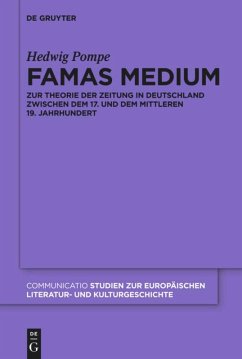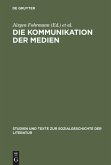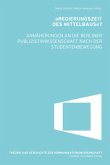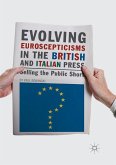As the new medium of the 17th century, the newspaper helped shape the core structural conditions for modernity: an accelerated pace of circulation, new information pathways, networking, and the reproduction of knowledge. These changes confronted the academic world with a major conceptual challenge: How should one describe the complexity associated with the newspaper as a new medium? The study traces the history of discourse about â??Fama's Mediumâ? (Fama was the Roman Goddess of rumor) between the 17th and the 19th centuries, and shows how that discourse might be linked to modern media theory, such as that of Marshall McLuhan.
Die Zeitung als das neue Medium des 17. Jahrhunderts entfaltet, repräsentiert und beeinflusst zentrale Strukturbedingungen der Moderne: neue Zirkulationsgeschwindigkeiten von Information, neue Wege der Kommunikation, eine andere Repräsentation und Vernetzung von Wissen und dessen Temporalisierung. Dies alles stellt die gelehrte Welt vor erhebliche Herausforderungen. Denn es gilt, zureichende Hinsichten zu finden, die die mit der Zeitung verbundene Komplexität darzustellen erlauben. Die Studie verfolgt den Diskurs über 'Famas Medium' zwischen dem 17. und 19. Jahrhundert, die darin verankerte negative und positive Zeitungskritik und zeigt schließlich, wie moderne Medientheorie (Marshall McLuhan) an diesen Diskurs anzuschließen wäre.
Die Zeitung als das neue Medium des 17. Jahrhunderts entfaltet, repräsentiert und beeinflusst zentrale Strukturbedingungen der Moderne: neue Zirkulationsgeschwindigkeiten von Information, neue Wege der Kommunikation, eine andere Repräsentation und Vernetzung von Wissen und dessen Temporalisierung. Dies alles stellt die gelehrte Welt vor erhebliche Herausforderungen. Denn es gilt, zureichende Hinsichten zu finden, die die mit der Zeitung verbundene Komplexität darzustellen erlauben. Die Studie verfolgt den Diskurs über 'Famas Medium' zwischen dem 17. und 19. Jahrhundert, die darin verankerte negative und positive Zeitungskritik und zeigt schließlich, wie moderne Medientheorie (Marshall McLuhan) an diesen Diskurs anzuschließen wäre.









